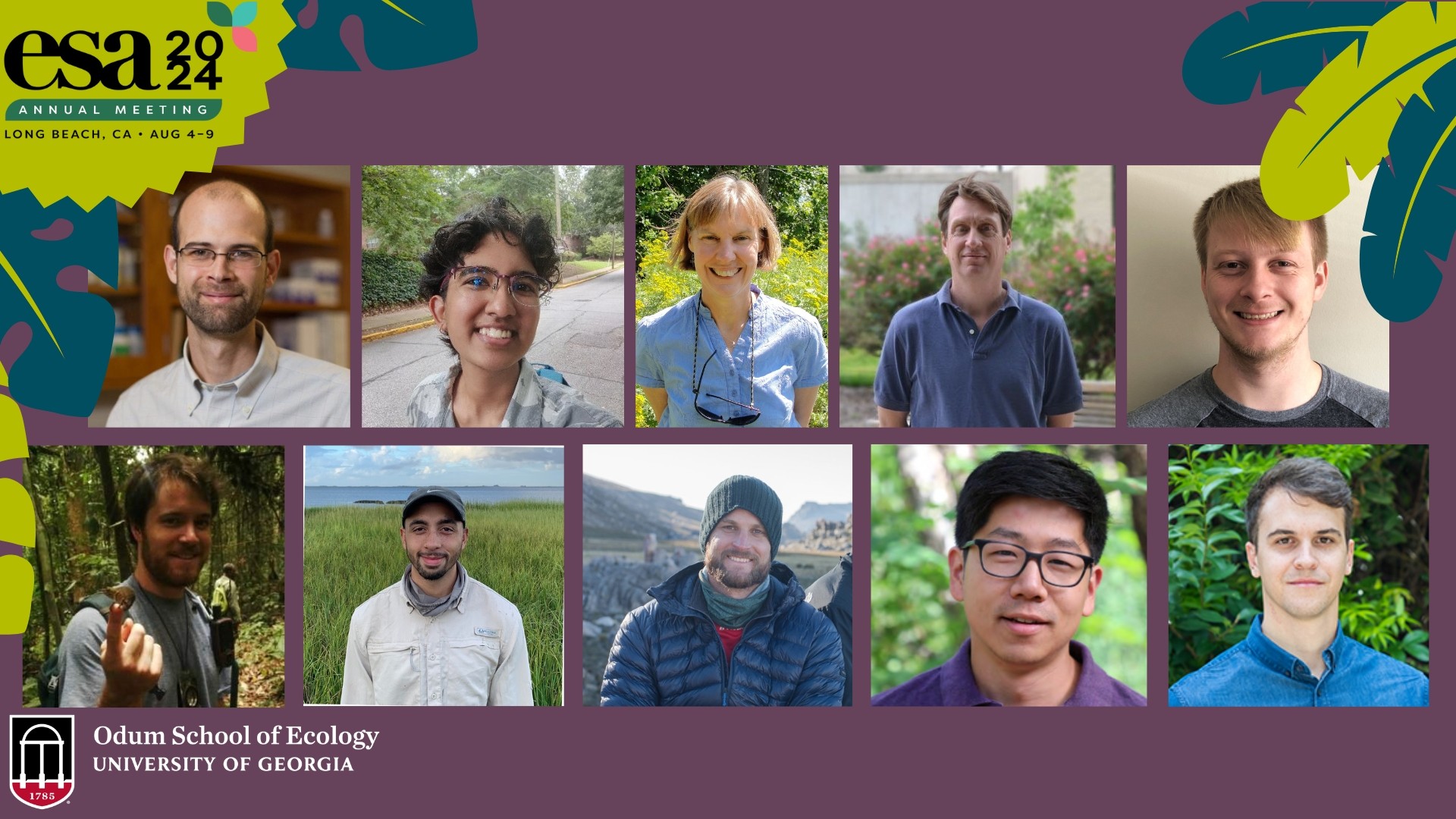This year’s Ecological Society of America’s Annual Conference will feature a number of speakers from the Odum School of Ecology, as well as speakers affiliated with other UGA schools and colleges. The conference is being held Aug. 5-8 In Long Beach, California.
Speakers affiliated with the Odum School of Ecology include:
Michael Belovitch, who graduated with a Ph.D. in summer, will present “Characterizing whole-plant vulnerability curves in Southern African savanna species”, which examines the ability of understudied trees and grasses of the savanna to transport water in relation to internal pressure.
Jason Donaldson is a senior research associate at the Odum School of Ecology. His paper, “Exploring the role of migrant trophic effects in resident parasite dynamics,” is a collaboration with the University of Glasgow to understand the effects of migratory animals carrying parasites by studying a herd of Serengeti wildebeest.
Director of the Center for the Ecology of Infectious Diseases John Drake will be presenting “Risk factors for the emergence of MERS-CoV in the camel economy of Ethiopia,” a study which looks at Middle East Respiratory Syndrome-Coronavirus and its effects on camel-producing communities.
Brendan Haile, a Ph.D. student at the Odum School of Ecology, will present “Food subsidy effects on host foraging behavior shape macroparasite burdens and impacts,” which looks at how parasites spread among animals in areas where food is provided by humans.
Ricardo Holdo, a professor at the Odum School of Ecology, will present “Can fire generate woody spatial structure in grassy ecosystems?,” a study of savanna grasslands and the role fire potentially plays in their tree distribution.
Carlos Molinero is a Ph.D. student at the Odum School of Ecology whose presentation, “Phylogeny, range overlap, and ecological traits predict parasite sharing in birds,” uses data analysis to study how parasites may be transferred from one species to another as bird distribution patterns are altered due to climate change.
Matthew Pierce is a Ph.D. student whose presentation, “Promoting the retention of minoritized students in environmental science through academic and professional development, enrichment activities, and mentoring,” seeks to address issues of diversity within the field of ecology and works to build a positive space for minority students.
Supraja Rajagopal is a Ph.D. student at the Odum School of Ecology. Their presentation, “Sublethal costs of infection reduce performance of collective tasks in social insects: A modeling study”, examines how infections in colonies limit the ability of members to partake in activities like foraging, resulting in lethal effects.
Daniel Suh, who graduated with a Ph.D. in summer, will present “Temperature and resource conditions jointly influence transmission of Metschnikowia bicuspidata in Daphnia dentifera,” which tracked the transmission of a pathogenic yeast in a species of plankton to see the role that temperature and food resources play in infection rate.
Monica Turner, who earned a Ph.D. in ecology in 1985, is a professor of Conservation Biology and Ecology at University of Wisconsin-Madison. Her presentation, “Novel pathways of postfire recovery alter the magnitude and phenology of evapotranspiration in subalpine forests,” looks at the impact of fires in the Greater Yellowstone area.
Speakers affiliated with other UGA units include:
Oluwatosin Babasola is a postdoctoral scholar at the Center for the Ecology of Infectious Diseases. His presentation, “Mathematical modeling of soil-rainfall interactions on the farm level crop yield,” investigates the relationship between rainfall, soil and the yield of cocoa crops in the western part of Africa.
Kanchana Balasubramanian is a Ph.D. student in the Integrative Conservation (ICON) program. In her presentation, “Unveiling social perception of ecosystem service bundles and trade-offs: Female forest landowners in Georgia, United States,” works to gain insight into female-centric perspectives on ecosystem services.
Caren Mendonça is a postdoctoral research associate at the Savannah River Ecology Lab whose research focuses on plant ecophysiology. Her paper, “Forest hydrologic components during early-stand development,” works to understand the changes in hydrology in stands of trees as they grow.
Jennifer McDaniel is a Ph.D. student at the Savannah River Ecology Lab presenting her paper ‘Quantifying tree foliage thermal tolerance and physiological response to fire,” which looks at the damage caused to trees by the high heat radiating from a fire rather than the flames themselves.
Melanie Merritt, a Ph.D. student in plant biology, will present her paper, “Desert plant root exudate chemical composition differs as elevated CO2 compared to CO2”, which looks at the effects of rising CO2 levels as a result of climate change on certain grasses and shrubs.
Julie Wang is a Ph.D. student in the Department of Crop and Soil Sciences researching the role that turfgrass weeds can play in pollinator habitats. Her presentation is titled “Refuge Lawn: Leveraging urban greenspace for pollinator habitat.”

